H.P. Lovecraft's influence within gaming is vast, and despite what one might suspect, it is not limited to the horror genre. From Amnesia: The Dark Descent to Bloodborne, plenty of titles have embraced Lovecraftian horror, leading to interesting gameplay mechanics that make players feel like their character's sanity is getting bent. Lovecraft's cosmic horrors have also inspired toe-curlingly terrifying enemies, and developers will likely continue to draw from his works for many years to come. This is certainly not a bad thing, as Lovecraftian horror has proven to be a trove of dark science fiction for artists to draw from.
Long after his demise, Lovecraft continues to draw fans, and his horror has yet to cease inspiring artists in all mediums. Lovecraft's history is an interesting one, and it may shed light on why themes of insanity are so prevalent in his stories. However, he is also a controversial figure due to his racist views that are sometimes reflected in his works.
Who Is H.P. Lovecraft?
Born in 1890 in Rhode Island, H.P. Lovecraft is one of the most recognizable names within science fiction and horror. His early life was marked with tragedy, and his father, Winfield Lovecraft, was institutionalized in 1893 before eventually dying of syphilis in 1898. His mother, Susan Lovecraft, was institutionalized in 1919 before she died in 1921. Lovecraft's love for writing began at a young age, and some of his earliest works were written when he was seven. He was also an avid reader, and he noted Edgar Allan Poe and Lord Dunsany as some of his most beloved authors. Throughout his life, he drew inspiration from a variety of sources, including Greco-Roman mythology, astrology, science, and Gothic literature.
In 1916, he published one of his first short stories, titled The Alchemist. His writing was well-received, so he continued to write, though it was not until Dagon, published in 1917, that the elements common in Lovecraft's writing would creep up. The short story features plenty of mystery, and the protagonist is confronted by an otherworldly creature that confounds his faculties of reason. Lovecraft would continue writing in this fashion, eventually carving out his niche of weird horror fiction that has come to be described as Lovecraftian horror. In 1918, he would begin his Dream Cycle series, which features stories about an alternate dimension that can only be accessed through dreams, and in 1920, he began publishing Cthulhu short stories, which would become some of the most iconic of his career.
Lovecraftian horror is characterized by its focus on insanity, which is often brought on through exposure to cosmic horror. In his writing, Lovecraft is quite fond of bypassing descriptions altogether, instead opting to claim that the otherworldly creatures encountered are simply ineffable. When reading Lovecraft's works, one is left with the feeling that the mysteries of the universe are far beyond the comprehension of mere humans, and that perhaps even science is a puny tool in the face of the incomprehensible phenomena that inhabit reality. There is not much gore in Lovecraftian horror, and the terror comes from how powerless humans are against unknowable cosmic forces.
Some of Lovecraft's creations have become permanent fixtures in pop culture. Many science fiction fans are familiar with Cthulhu, a malevolent cosmic entity that is worshiped by cultists. Cthulhu is indescribable, and it is said to have elements from octopuses, humans, and dragons. The Necronomicon, or the Book of the Dead, has also been frequently referenced in pop culture. Like many other things in Lovecraft's stories, the Necronomicon is shrouded in mystery, and not much is known about what the dark text contains.
Although Lovecraft's influence and impact are undeniable, it should be noted that in recent years, a spotlight has been shone on the controversial aspects of his legacy. Most notably, Lovecraft expressed many racist views, and some have argued that the interbreeding between humanity and cosmic monsters that occurs in his short stories may allude to his negative views of miscegenation. These aspects of his legacy are explored in Lovecraft Country.
Lovecraftian Horror in Video Games
Lovecraft's impact can be seen in various art mediums, including gaming. Most commonly, games will make use of Lovecraftian horror's fixation with insanity to craft its terrifying moments. This is seen, for instance, in Amnesia: The Dark Descent which has players trying to navigate Castle Brennenburg by solving puzzles and escaping from monsters that look like they are straight out of Lovecraft's imagination. Players must conserve their sanity by staying out of the darkness, or in classic Lovecraftian style, by not looking directly at monsters.
One of the most popular Lovecraftian games is FromSoftware's Bloodborne, which was released in 2015. It sports a heavy Gothic aesthetic, and as players explore the streets of Yharnam, they gain Insight, which causes the world around them to change in strange ways. Yharnam has its own cosmic beings, the Great Ones, and they were worshiped by the residents of the city, as they provided powerful healing blood, though it also brought a horrible plague. Not all games attempt to be subtle with their Lovecraftian influences, including Cyanide's Call of Cthulhu, which is inspired by the Lovecraft short story of the same name. It incorporates plenty of elements that will be familiar to Lovecraft fans, including twists on sanity, the Necronomicon, and plenty of cosmic horror.
Lovecraftian horror continues to inspire games like Bloodborne due to how effectively it reminds one of how minuscule humans are in the universe. While humankind might rule the tiny rock called Earth, there is no telling what tyrants could be lurking in the dark corners of the cosmos, and although humanity may have taken comfort in science's ability to explain reality, Lovecraft's stories serve as a reminder that there are still plenty of unknowable mysteries. In ways Lovecraft could have never imagined, his creations have birthed some of gaming's most iconic titles, many of which present his own cosmic horror in new and shocking ways.






